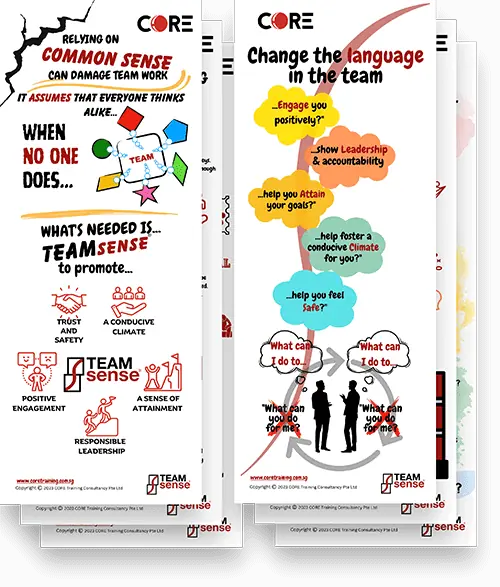At CORE Training, we kick off each session with the aim of creating what we refer to as “Aha! moments.” The Accelerated Learning framework plays a crucial role in helping us achieve this goal. But what exactly is Accelerated Learning (AL), and how does it enhance the effectiveness of our training?
The Evolution of Accelerated Learning
Accelerated Learning has its roots in the early 20th century, shaped by the efforts of educators and psychologists focused on enhancing learning efficiency. The concept gained wider recognition during the 1960s and 1970s, primarily due to Dr. Georgi Lozanov, a Bulgarian educator who pioneered the Suggestopedia method. This approach underscored the significance of relaxation and suggestion in the learning process, paving the way for further exploration of optimal learning environments, psychological conditions, and educational methodologies.
Over the years, Accelerated Learning has been further developed by various influential figures. Dr. Tony Buzan introduced mind mapping, while Dr. Robert Dilts brought attention to Neuro-Linguistic Programming (NLP) strategies. Today, AL is a versatile and evolving approach that draws insights from cognitive psychology, neuroscience, and educational theory.
Key Differences Between Accelerated Learning and Traditional Teaching Methods
1. Learning Environment
- Accelerated Learning: Prioritises an engaging, supportive, and non-threatening atmosphere, enhanced by comfortable seating, appropriate lighting, and sometimes music.
- Conventional Teaching: Typically adheres to a rigid classroom setup, with desks arranged in rows and the teacher at the front, fostering a hierarchical environment.
- CORE Training Consultancy: In our workshops, we arrange furniture to promote group discussions and collaborative activities. We prefer spaces with movable furniture over traditional lecture setups, good audio and the ability to control the room temperature.
2. Role of the Instructor
- Accelerated Learning: Instructors serve as facilitators, guiding learners in constructing their own understanding.
- Conventional Teaching: Teachers are the primary authority, delivering content directly.
- CORE Training Consultancy: This is why we incorporate simulations and hands-on games that encourage participants to explore topics actively, rather than relying solely on lectures.
3. Learning Styles and Personalisation
- Accelerated Learning: Acknowledges the diversity of learning styles, incorporating visual, auditory, and kinaesthetic modalities.
- Conventional Teaching: Often utilises a one-size-fits-all approach, focusing primarily on verbal lectures and written assessments.
- CORE Training Consultancy: Our sessions involve participants in group discussions, role-playing, and visual presentations, in contrast to conventional classes that might focus mainly on note-taking and exams.
4. Focus on Experience and Application
- Accelerated Learning: Emphasises experiential learning, encouraging practical application of knowledge.
- Conventional Teaching: Frequently prioritises theoretical knowledge, which can create a gap between learning and application.
- CORE Training Consultancy: We engage participants in simulation exercises that allow them to apply lessons immediately, unlike conventional courses that may focus solely on textbook theories.
5. Feedback and Assessment
- Accelerated Learning: Promotes continuous feedback and peer assessment, fostering a collaborative learning atmosphere.
- Conventional Teaching: Relies on formal assessments and grades, which can induce anxiety among students.
- CORE Training Consultancy: Our learners take part in group feedback sessions that include self-reflection, discussions, and sharing insights, as opposed to conventional classrooms that often rely on mid-term and final exams.
6. Motivation and Engagement
- Accelerated Learning: Enhances intrinsic motivation by linking learning to personal interests and passions.
- Conventional Teaching: Often resorts to extrinsic motivators, such as grades, which may undermine intrinsic motivation.
- CORE Training Consultancy: In our workshops, we encourage participants to explore their passions and interests, enhancing their engagement with the material.
7. Flexibility and Adaptability
- Accelerated Learning: Naturally flexible, adapting methods based on the needs of the learners.
- Conventional Teaching: Generally adheres to strict curricula and timelines, which can stifle creativity and responsiveness.
- CORE Training Consultancy: We often receive feedback that our agenda is fluid and adaptable. We adjust our plans based on subtle group feedback, ensuring the lessons resonate rather than sticking rigidly to a predetermined outline.
8. Community and Collaboration
- Accelerated Learning: Fosters a sense of community and collaboration among learners, encouraging interaction and shared experiences.
- Conventional Teaching: Often emphasises individual achievement and competition, which can isolate learners.
- CORE Training Consultancy: Our workshops are designed to create a collaborative environment where participants work together, share ideas, and learn from each other, contrasting with conventional methods that may prioritise individual performance.
Accelerated Learning represents a significant departure from conventional teaching methods by emphasising supportive learning environments, positioning facilitators as guides, accommodating diverse learning styles, promoting experiential learning, providing ongoing feedback, nurturing intrinsic motivation, enhancing adaptability, and fostering a sense of community. As learners’ needs evolve—particularly in response to the shorter attention spans characteristic of today’s fast-paced society—embracing methodologies like Accelerated Learning becomes crucial. Such approaches cultivate lifelong learners who are well-equipped to navigate and thrive in an increasingly complex landscape. That’s how we create ‘Aha! moments’.



